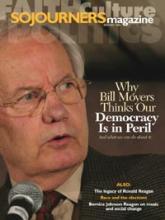Throughout the first year of the Iraq war, the Bush administration managed to keep a pretty tight lid on the war news that reached U.S. media consumers. Embedded reporters told the battlefront story from the viewpoint of U.S. troops. And the big media institutions back home - right up to The New York Times and The Washington Post - mostly refrained from asking inconvenient questions.
As a result, most of the American people bought the official story line most of the time: The Iraqi regime has weapons of mass destruction. It kind of, sort of has something to do with al Qaeda. The Iraqi people see us as liberators, etc.
The Cheney-Rumsfeld cabal had a long, easy ride in the media. But as this is written, ugly and inconvenient facts are tumbling into the media mainstream at a dizzying pace. And public confidence in the justice of the U.S. cause, and the competence of our leaders, is quickly eroding.
Cheney, Rumsfeld, and Co. have bested the "best and the brightest" of Vietnam fame by having their Tet and My Lai in the same month. The armed uprisings in Fallujah and Najaf - like the Vietnamese Tet insurgency of February 1968 - gave lie to the official war story. It has become impossible to believe that most Iraqis still see us as the good guys, or that the resistance is just a few isolated Saddam loyalists. Meanwhile, the abuse of Iraqi prisoners - like the 1969 revelation of the My Lai massacre - has destroyed America's reputation as a world leader and put a dent in our own righteous self-image.
Read the Full Article
